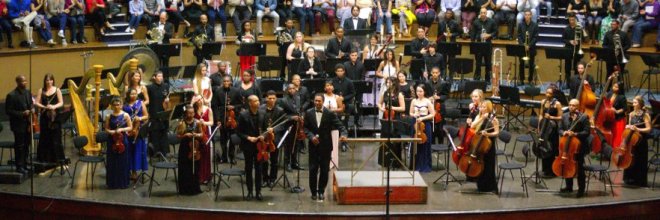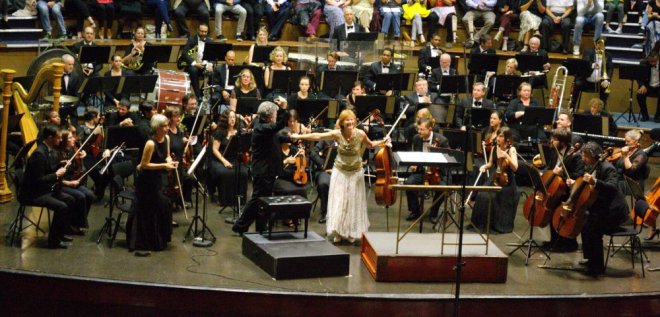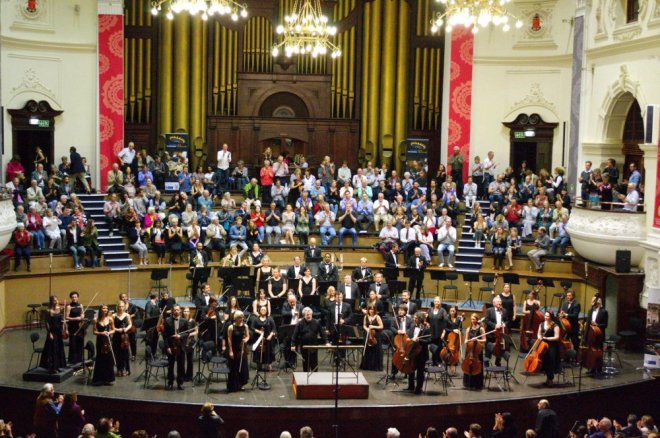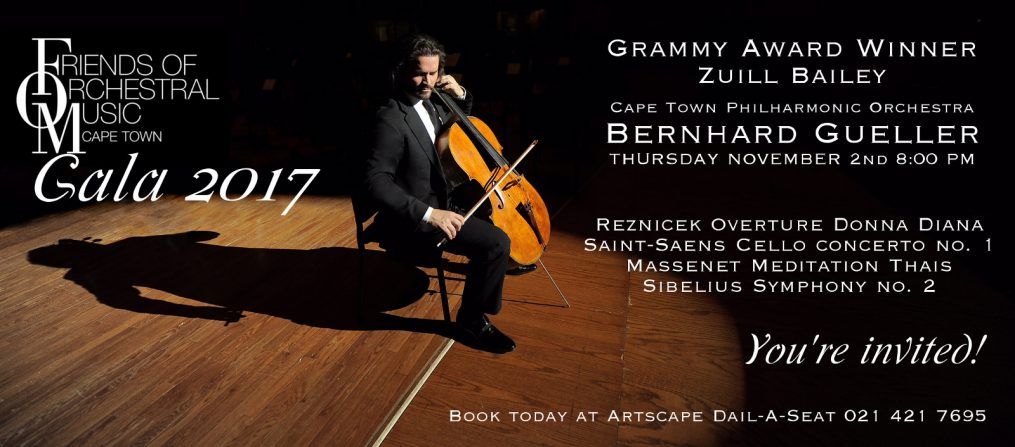Reviewed by Andrew Wilding
Cape Town Philharmonic and Youth Orchestras, City Hall, Thursday 12 November 2015
This concert was dedicated to CPO board member Ronnie Samaai, mentor to many of Cape Town’s current professional musicians. As a glimpse into the future, I always find our Youth Orchestra encouraging to watch, and last night they honoured Mr. Samaai with a polished performance of high standard.

Brandon Phillips with the Cape Town Philharmonic Youth Orchestra after the Dvořák
.
Curtain Raiser – Dvořák – Symphony No. 9 (iv.)
Brandon Phillips, Cape Town Philharmonic Youth Orchestra
Conductor Brandon Phillips achieved a professional pace and good balance, with strong strings against Dvořák’s beloved trombones. His energised and physical conducting style is an agreeable blend of uniqueness and accuracy, and draws a comprehensive response from the orchestra, delivering dramatic dynamics while maintaining sufficient reserve for the climaxes. The CPYO performed outstandingly, particularly woodwinds, with excellent running flutes in the new world theme by Madré Loubser and Robert de Vries, and masterful control from William Hendricks, clarinet. The coda was concise and crisp – in all areas a most encouraging performance.
.

Maria Kliegel after Bruch, Kol Nidrei, with Bernhard Gueller
.
Bruch – Kol Nidrei
Maria Kliegel, Bernhard Gueller, Cape Town Philharmonic Orchestra
Quite a way into this work I realised that I was too spellbound to make any notes! Kliegel is phenomenal. Far beyond mastering the demanding techniques of an imperceptible attack and limitless legato, she demonstrates extraordinary knowledge and effortless use of natural harmonics to echo the ends of her phrases. Even more mesmerising, is her ability to use bow harmonics, which were clearly audible throughout her longer strokes. Her sound is exquisite – a contemplative, meditative delivery of each phrase, as if she were merely observing the melody naturally growing from within the instrument.
Bloch – Schelomo
Maria Kliegel, Bernhard Gueller, Cape Town Philharmonic Orchestra
In her second appearance, Kliegel sang of the lush exotic romanticism of one of history’s most illusive figures – King Solomon. She interpreted the loosely-metered introduction in the style of ancient Indian, Middle Eastern, and Klezmer music, where the mode or raga of the piece is stated and explored through free improvisation, before developing into the rhythmic section. Kliegel performed as if phrases were coming to her in the moment. She narrated with a humanism that seemed to span every major emotion, and reflect on the wonderful magnificence and pointless wrongs of the world. Her cello was a contemplative observer of joy and suffering alike, acknowledging as if looking down from above, occasionally becoming involved with appropriate passion, indignation, sensitivity, or hopelessness.
Extremely complex, the work comprises frequent mood changes and often portrays the disparateness that occurs when differences can not be resolved. Fragments of the orchestra wonder off in different directions, and accelerate away from the central tempo. It must be maddening to play, and it is a great accolade for the Cape Town Philharmonic to deliver this work at the international standard that we heard last Thursday. Their synchronism was amazing – perfect entries after pauses, even with percussion. If this concert were broadcast and viewed internationally, the world would see a top performance by cellist, conductor, and orchestra.
.

.
Dvořák – Noon Witch
Bernhard Gueller, Cape Town Philharmonic Orchestra
Rather a dark tale, this is never the less, a very magical work and these are always delightfully, and animatedly brought to life by Gueller’s characteristic exciting, dynamic style. We often hear the layering of parts, so that each has its own space in the sound. Atmospheric parts are a softer, in the background, to highlight the melody or soloist, wonderfully illustrated with the appearance of the witch: wispy wraith-like violins supported the wonderful mysterious resonant tones of Brandon Phillips, wearing his bassoonist hat. The winds had much of the descriptive work, sounding convincingly mediaeval and folky, with stunning synchronisation between Daniel Prozesky’s clarinet and the flute of Gabriele von Durckheim.
Beethoven – Symphony No. 7
Bernhard Gueller, Cape Town Philharmonic Orchestra
As a piano student of Beethoven specialist Dr. Stewart Young, I have long been a supporter of the “new school” concerning the tempi of Beethoven’s works. The metronome was invented during his time, and the issue of tempo markings is clouded because his metronome seems to have been faulty – many of his tempo markings are absurdly fast and impossible to play. For this reason, most publishers omit tempo markings from Beethoven’s scores, leaving only the Italian terms: allegro, andante etc. However, recent scholars of music such as Dr. Young, David Zinman, Kurt Zandar, and Bernhard Gueller, seem to agree that some clarity can be found with Beethoven’s pupil: Carl Czerny. Czerny’s tempo notes at performances given by Beethoven or approved by him, still exist. It is largely from these notes that accurate tempi can be allocated.
One difference in the “new school” is that some works are quite a lot faster than interpretations by the likes of Klemperer and Karajan. When it comes to the symphonies, the higher tempi makes them rather more challenging for orchestras, and this makes sense to me because Beethoven was after all a virtuoso. To play his violin concerto is among the greatest achievements, sonatas are among the most challenging – should we not then expect that his symphonies would be equally demanding? By Czerny’s indication, the symphonies could be interpreted almost as concerti for orchestra.
Gueller’s tempi for the four movements of this symphony were very close the only recording in the Fine Music Radio library that I will play: the Zinman, with the Tonhale Orchestra, Zurich. Both Gueller and Zinman give a decidedly Czerniesque interpretation that demands virtuoso from the instrumentalists, and fortunately, we have an amazing orchestra, who rose to the challenge with accuracy and synchronism. If Gueller’s recording with the CTPO were available in the Fine Music Radio library, I would have two to choose from!
References:
http://www.twopianists.com/Catalogue/TP1039053.html
http://www.petermartens.co.za/recordings.html
http://thebeethovenproject.com/how-fast-shall-we-play/
